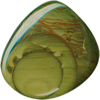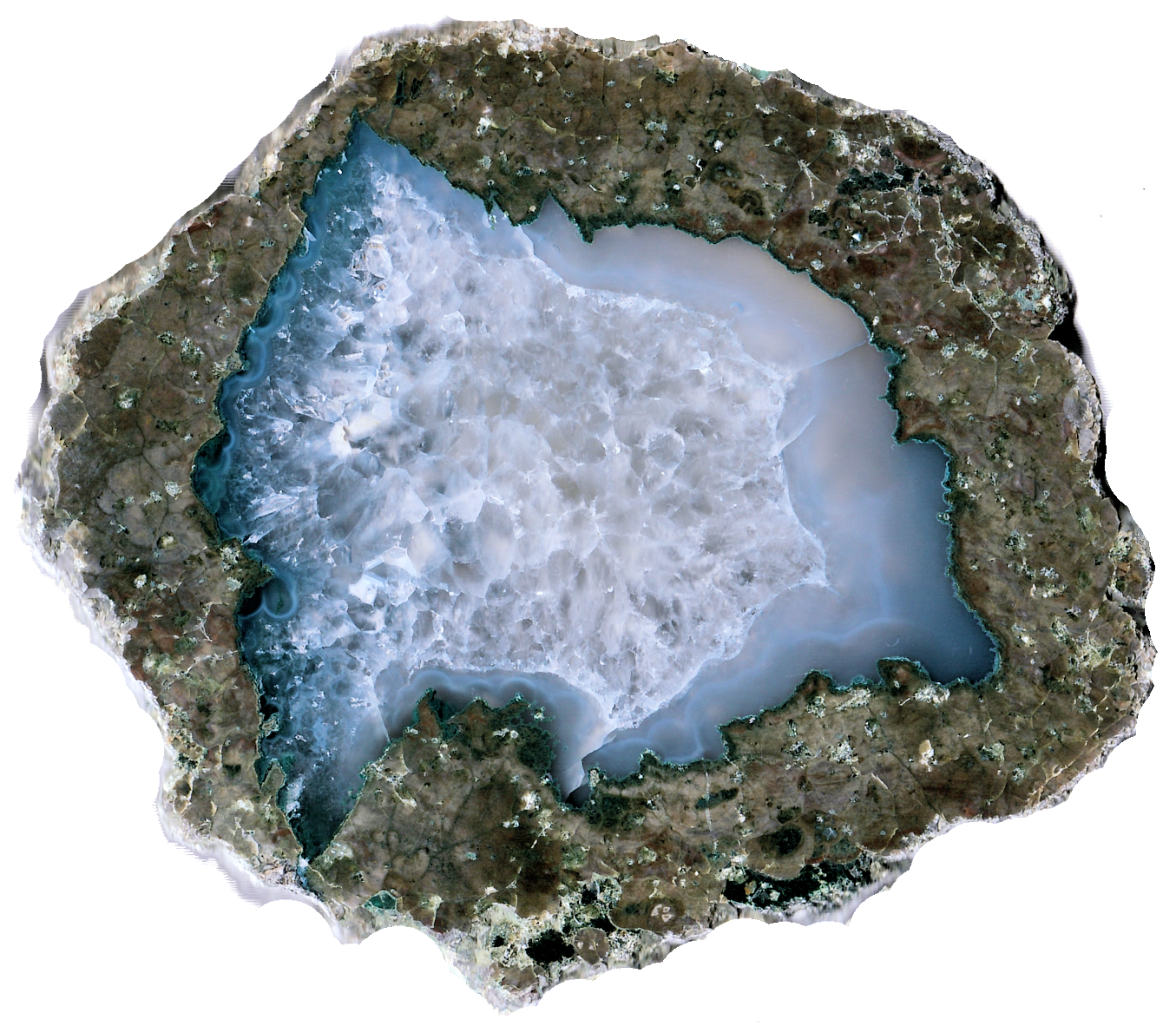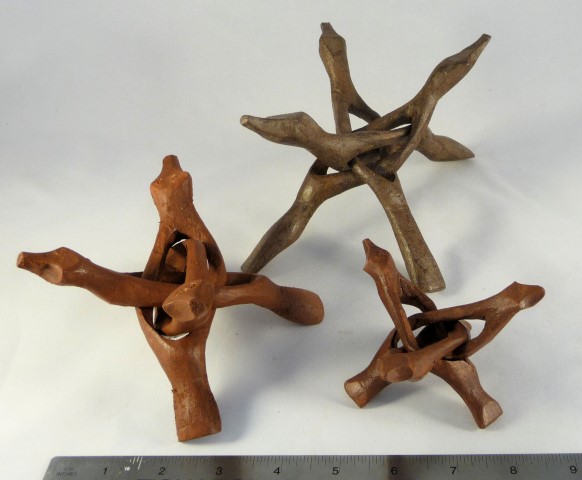
This is a HUGE page, the photos may take some time to load depending on your connection speed.
Many of the thundereggs I sell are fluorescent in SW = shortwave and/or LW = longwave UV = ultraviolet light. Some are spectacular, displaying bright and subtle green, yellow, blue, white, or purple colors. Many times the fluorescent colors are very different from the visible light colors, and don't necessarily look similar. In other words you can get a different "look" under UV light vs. daylight. Some eggs fluoresce in green or yellow but not very strongly. They're still cool to look at under UV anyway. I can't guarantee that every egg I sell from the types that do show fluorescence actually will fluoresce, but many / most / all will.
You can purchase special SW and LW UV lights from many reputable online sellers. I'd recommend steering clear of Amazon and EBay since you can never know exactly what you will be getting unless you know the particular model is appropriate. I do recommend the websites specializing in fluorescent minerals, of which there are a few to choose from. Lights vary tremendously in price and quality (mostly in brightness and the amount of visible light they emit). For beginners most of the combination SW and LW field lights will work just fine in a dark room, and may be powerful enough in ambient light to check for specimens (hint: take one to a rock show, you'll be surprised at what you find!). If you want to display your specimens, the more expensive and powerful lights are worth considering. Here are just a few samples from my collection - enjoy! :)
A small digital camera like mine will take nice photos in UV light if it has a "night sky" or similar setting. This takes photos for a specified time - I use 15 seconds - it takes multiple images then combines them together into one photo. Cameras in the standard or "low light" or "high sensitivity" mode can take OK photos under UV light - but the sensors tend to get "fooled" since they see only visible light, so it can really goof up both the focus and the exposure under UV. My suggestion is to focus under visible light, turn the lights off and the UV on, then take the photo without refocusing (on my camera I just press the button all the way firmly to avoid the focusing stage). The left photo is in "daylight" fluorescent (visible) light, the middle in LW UV, and the right in SW UV.
Here are some eggs from my collection - enjoy! :)
(Click one to go there)
CLICK ON THE PICS TO SEE THE FULL SIZE VERSION
Note: My camera tends to make the LW pics much "bluer" than they really are (I'm working on correcting that if I can)!
PS. These eggs aren't available for purchase. If I ever do sell them, they'll be on the Polished Thundereggs page
Jackrabbit Spring Idaho - All of these eggs fluoresce strongly
"Daylight" compact fluorescent floods (left), longwave UV (middle), shortwave UV (right). The same with most all of the following pics. These eggs are very well known for their fluorescence. Some are phosphorescent - the green in particular fluoresces for a second or so after the UV light is turned off.
By "strongly" I mean crazy bright. The range of colors in LW UV is impressive - white, blue, pale yellow, green, even pale salmon shades - even though they don't really show in some of these pics. I'm working on correcting that!
Buchanan Oregon - So far all of these fluoresce wildly and in multiple colors, especially the agate - sometimes even the matrix fluoresces a bit
The coolest one I have photographed, by far - Wild and crazy, man :) Notice how different the patterns are under UV, sometimes you can "see" details that aren't visible under normal lighting. It's so bright the floor of the cavity washes out (it overwhelms the camera's sensor). The last photo is a double exposure under visible and SW UV light.
Visible (left), longwave (middle), shortwave (right). The matrix is somewhat fluorescent in these, which is unusual
There are brilliant red spots in the upper right that barely show in the photo
A rare Buchanan "tube egg" pair. Rod Robins (the rancher who owned the beds, now sadly deceased) and I dug these in 2012. To my knowledge these are the only ones dug for over 40 years.
Another tube egg
My naughty tube egg ;) Cool reds in SW.
From the first bed discovered, dug in the 1970s. Insane colors, my second favorite fluorescent egg (so far LOL).
Priday Agate Beds (Richardson Ranch), Oregon
Red bed
In general the LW light tends to produce cooler, bluer colors, the SW light gives greener, more intense colors. Most of the purple matrix is due to reflection from the light, not fluorescence. A lot of the banding in these eggs is much stronger in UV.
Blue Bed
These can be fantastic! Very colorful in LW UV.
Double egg from Paul Colburn's "Blackjack drift" in the Blue Bed. The vertical purple line is cyanoacrylate glue.
Various beds
I used both the LW and SW lights in the right photo for a more interesting look :)
Notice how much more the banding shows up in the UV photos.
Not too much difference between LW & SW.
McDermitt "Middle bed". I think there's a theme here (SW looks a lot like LW).
Lucky Strike Mine, Oregon
Is there a ghost in the LW photo? :)
Alex McDonald "Green Eggs n Ham Bed", Oregon
Mostly jelly opal center, which fluoresces crazy bright white in LW, an eerie green in SW
Eagle Point (aka Dant & Frieda) Oregon
Visible & SW UV.
Valley View Mine, Oregon
Vis & SW UV. Nice royal blue color. The nearby Lucky Strike eggs don't fluoresce very much.
Cottonwood Creek (aka Harper & Skull Spring) Oregon
Very bright!
Ochs Pony Creek Bed, Oregon
So bright it almost hurts your eyes :)
Baker Ranch, New Mexico
The matrix fluoresces with pretty spots in this one.
The matrix doesn't fluoresce at all. Weird...
Desolation Canyon, Oregon
The translucent agate in the center is totally opaque in UV
Some of the agate only fluoresces in SW UV. Forgive the reflection of the UV flashlight in the LW photo :(
Friend Ranch, Oregon
The banding in the black ring in the SW photo is totally invisible in daylight.
The same with this egg. Many more details are visible in SW light.
Fallen Tree Bed, Oregon
LW only, nothing more fluoresces in SW.
Steens Mountain, Oregon
Most of these have a white mineral center (probably a zeolite) surrounded by a thin agate layer. The minerals, whatever they are, all fluoresce in multiple colors.
Not sure where some of these are from, unfortunately
Secret Ridge (aka Harney Rim), Oregon
Beautiful pair, too big to fit in the same photo!
Little Naches River, Washington. The blue lines are cyanoacrylate glue, this one was pretty shattered like many of them are.
White Fir Spring, Oregon. From the agate bed. The more well-known jasper eggs from White Fir don't fluoresce at all.
Stephenson Mountain, Oregon
Whistler Spring, Oregon. Green under both LW and SW UV. Notice how the patterns in UV are mostly invisible in normal light. This is the only fluorescent one in my collection.
Upper Tub Spring, Antelope Oregon
Trollin Ranch, Oregon
Utah (unknown location)
Oregon unknown bed. Some of the banding is only visible in UV.
Oregon (probably Priday)
Oregon (prob. Pony Creek or Priday)
![]()
 OreRockOn Rock Dig Locations DVD NEW VERSION 8!
OreRockOn Rock Dig Locations DVD NEW VERSION 8! Lapidary Materials, Faceting Rough, Fossils, and More for Sale
Lapidary Materials, Faceting Rough, Fossils, and More for Sale
 Lapidary Arts Instruction Classes
Lapidary Arts Instruction Classes
 Rock Cutting and Polishing Services
Rock Cutting and Polishing Services
 Polished Agates for Sale
Polished Agates for Sale
 Polished Thundereggs for Sale
Polished Thundereggs for Sale
 Faceted Gemstones for sale
Faceted Gemstones for sale
 Cabochons for Sale
Cabochons for Sale
 Rock Crystal Geodes for Sale
Rock Crystal Geodes for Sale
 Rock Display Stands for Sale
Rock Display Stands for Sale
 Rock & Lapidary Bookstore
Rock & Lapidary Bookstore
 Back to
Ore-Rock-On!
Back to
Ore-Rock-On!
Copyright © 1997 - 2023